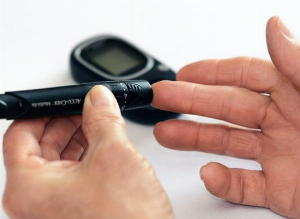Diabetes and the Coronavirus
Published Apr 29, 2020 • By Camille Dauvergne
According to the Diabetes Research Institute, 34.2 million people, or 10.5% of the U.S. population are living with diabetes, with approximately another 7.3 million who have not yet been diagnosed. Type 2 diabetes accounts for more than 90% of cases. The CDC has stated that patients with diabetes, including type 1, type 2, or gestational, may be at higher risk of severe illness from COVID-19.
What explains this risk? How can we protect ourselves? Should we fear a shortage of anti-diabetic medications? Let us answer all your questions!

Why does my diabetes put me at greater risk of complications?
According to Professor Lyse Bordier, Head of the Diabetes Department at Begin Military Hospital in Paris, diabetic patients have weaker immune system defenses than healthy patients. Their bodies therefore defend themselves less well in the event of contamination by SARS-CoV-2 (coronavirus) and they can develop a serious form of the infection.
Poorly controlled diabetes leads to more frequent hyperglycemia, which also affects the organs and immune defenses, leading to possible complications in the event of infection.
This risk is even greater if you have comorbidities, i.e. other conditions associated with your diabetes, such as high blood pressure and other cardiovascular problems, being overweight or obese.
A study published in the American Journal of Respiratory and Critical Care Medicine on patients treated in hospital in China between January 9 and February 15, 2020, showed that the majority of patients who died from complications of the infection were men around 50 years of age who had high blood pressure or diabetes (without specifying which type of diabetes).
Can COVID-19 worsen my diabetes?
Professor Bordier points out that the coronavirus infection can also worsen diabetes in a stable patient. Indeed, hospitalized diabetic patients may have an increased insulin requirement for insulin-dependent patients, or may require a switch to insulin therapy for patients treated with oral antidiabetic drugs such as METFORMIN, GLUCOPHAGE, or AMARYL.
There are several hypotheses, according to Professor Bordier, regarding this destabilization of diabetes caused by the virus. However, due to the lack of hindsight on the pandemic, none of them has been scientifically proven for the time being.
The hypotheses are as follows:
- Blood sugar levels can be destabilized by the mechanisms of the infection.
- SARS-CoV-2 could have a direct impact on organs such as the pancreas and liver, resulting in impaired insulin secretion.
Is there a different risk depending on the age of diabetes patients?
Regardless of the chronic condition, and whether or not the patient has a chronic condition, the risk of developing complications with COVID-19 increases with age. The older you are, the less effective your immune system is in protecting you against infection.
Therefore, older diabetic patients are more exposed to this risk.
Is prediabetes a risk factor for complications?
As a reminder, prediabetes is defined as fasting blood sugar level from 100 to 125 mg/dL (5.6 to 7.0 mmol/L). Pre-diabetes can be observed before the transition to type 2 diabetes (fasting blood sugar level > 126 mg/dL (7.0 mmol/L)), and can also be reversed by diet and lifestyle adjustments.
Although you do not have hyperglycemia in the prediabetes stage, this state of higher-than-normal blood sugar levels may put you at risk of destabilizing your blood sugar concentration in the event of coronavirus infection. This may result in temporary insulin-dependent type 2 diabetes during the period of infection.
Due to lack of data, it is unclear whether the infection can also lead to a transition from prediabetes to long-term diabetes after recovery.
How can I keep my diabetes stabilized in spite of the lifestyle changes that the lockdown entails?
Professor Bordier, as well as the American Diabetes Association and the Juvenile Diabetes Research Foundation offer some helpful advice, such as:
- Reinforce your self-monitoring of your blood sugar levels to make sure your diabetes is stable.
- Have enough insulin, medication and diabetes to "last" two weeks - keeping a sufficient supply of insulin is clearly important, but you should also make sure to have enough equipment and monitoring supplies (test strips, lancets, infusion sets, syringes, catheters, reservoirs or pods, extra batteries, Glucagon, etc.)
- Keep up a daily form of physical activity, even if it is moderate. The CDC has a few recommendations here.
The US Department of Health and Human Services has started the Move Your Way initiative featuring a free Activity Planner which helps you to set your own weekly goals, choose the activities you want to do, and get personalized tips to help you stay motivated: Move Your Way Activity Planner - Know what to do in case of an imbalance in your blood sugars (hypoglycemia in particular): make sure to brush up on ketones (and diabetic ketoacidosis (DKA)), correction bolus, etc.
- Have the emergency numbers available: 911, the number for your GP and diabetes clinic, the medical and technical on-call numbers if you use an insulin pump, etc.
- Maintain a therapeutic relationship with your GP or diabetes specialist, if possible through Telehealth, to avoid serious complications specific to diabetes. It is also essential to continue necessary cardiovascular treatment and follow-up as well as follow-up for your diabetes, podiatry, ophthalmology or nephrology.
- Avoid going to hospital or the clinic for testing (where there is a potential risk of contamination) unless your doctor tells you that the test is urgent and obviously necessary. If you have any questions about your examinations and tests, do not hesitate to ask your doctor. In any and all cases, respect the isolation measures and barrier gestures.
I have a wound on my foot: can I defer my care?
The American Podiatric Medical Association has advised its members, following a special communication published in its journal, to implement a Pandemic Diabetic Foot Triage System to "reduce the burden on the healthcare system by keeping diabetic foot and wound patients safe, functional, and at home." This newly established care pathway should allow patients with diabetes to be taken care of quickly and to limit the risks of complications due to a delay in care, which can lead to serious hospitalization.
If you think you need emergency podiatric care (wound, abnormal lesion, etc.), contact your usual podiatrist or your GP who will assess the urgency of your situation and refer you, if necessary to the emergency unit in your area.
Are there concerns about a shortage of diabetes medications?
There is no evidence that diabetes medications (insulin and others) may be in short supply. Similarly, there are currently no shortages of supplies for medical devices.
Leading manufacturers are reporting that COVID-19 is not having an impact on their current manufacturing and distribution capabilities for insulin and other supplies at this time.
If you are struggling to pay for insulin or diabetes medication, the ADA has resources to help here.
How do I find support on Carenity?
Carenity currently has thousands of patients and relatives of patients affected by type 1 and type 2 diabetes. On the platform, you can find support from other members of the community. It is important to help each other, especially in this difficult time of COVID-19 pandemic. Join our current discussions below!
- Type 2 Diabetes and the Coronavirus - questions, concerns, precautions?
- Type 2 diabetes and the coronavirus: Are we more at risk?
- Type 1 Diabetes and the Coronavirus - questions, concerns, precautions?
- Diabetes and the coronavirus - what is the risk?
Contacts and useful sites
- The American Diabetes Association is the leading non-profit seeking to educate the public about diabetes and to hope those affected by it by funding research to manage, cure and prevent diabetes.
- The Juvenile Diabetes Research Foundation (JDRF) is the world's leading charitable funder of type 1 diabetes research; funding research to cure, treat and prevent type 1 diabetes. They provide information and give a voice to children, adults and parents living with the condition, at all stages from diagnosis and beyond.
- USDA ChooseMyPlate Nutritional Advice and Guide - ChooseMyPlate
Was this article useful to you? Do you have any other tips to share with the community?
Take care and stay safe!
https://www.federationdesdiabetiques.org/federation/actualites/le-prediabete
https://solidarites-sante.gouv.fr/IMG/pdf/guide_pds_diabete.pdf
https://www.diabetesresearch.org/diabetes-statistics
https://www.atsjournals.org/doi/pdf/10.1164/rccm.202003-0543OC
https://www.japmaonline.org/doi/pdf/10.7547/20-051
https://www.cdc.gov/diabetes/managing/active.html
Comments
You will also like

Diabetes: Discrimination, Professional Life, Plan Ahead... What do patients say?
Nov 9, 2018 • 9 comments

Fighting Schizophrenia Symptoms: a Long Journey Against Paranoia after Denial and being Admitted
Dec 12, 2018 • 6 comments

 Facebook
Facebook Twitter
Twitter
